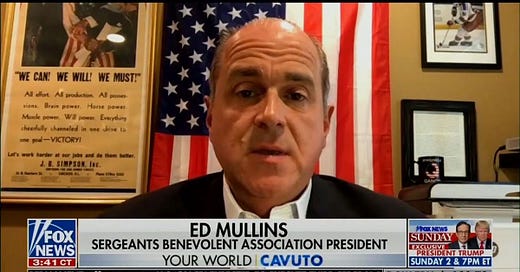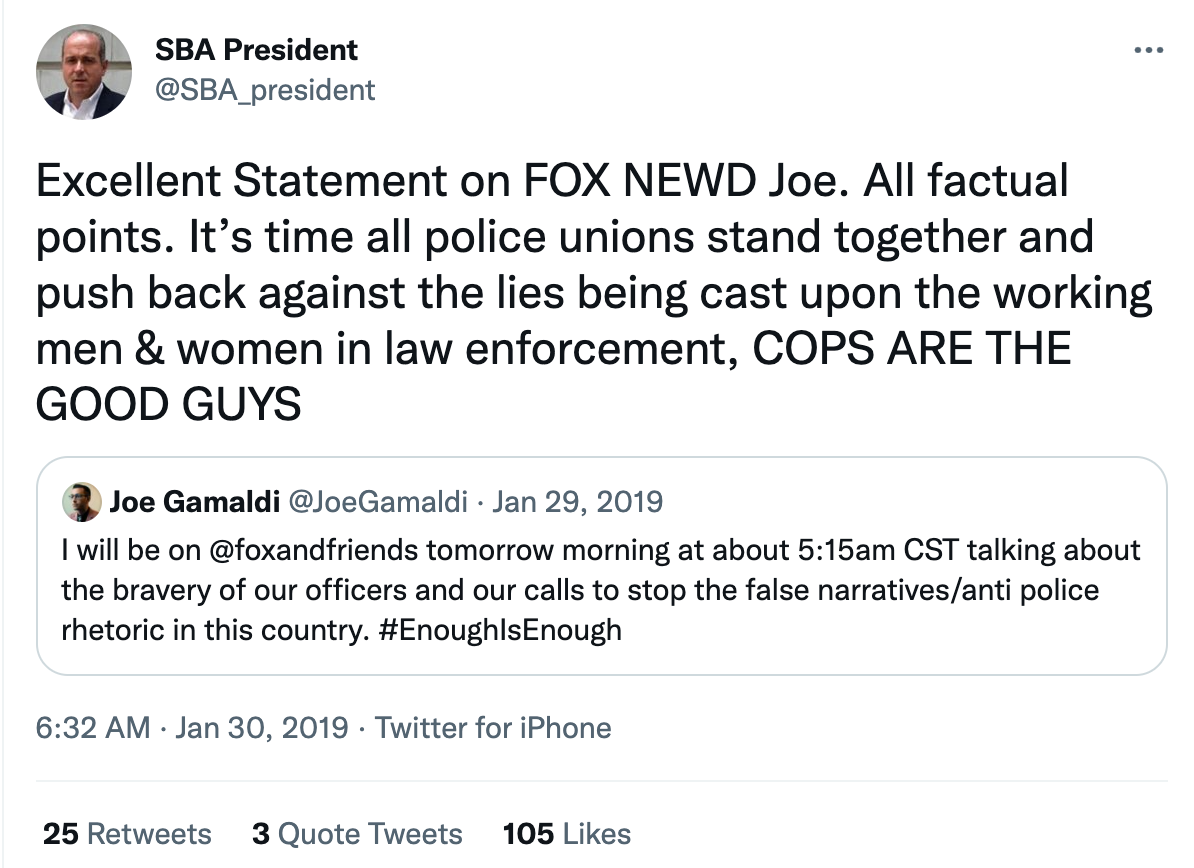Hello Discontents! Katie from All Cops Are Posters here. Last week, I took a little time to talk about the… let’s say… “communication style” of the man who was in charge of New York’s loudest police union: Ed Mullins, disgraced Sergeants Benevolent Association president and absolute Twitter maniac.
Mullins resigned from his position at the head of the org and copped an early retirement from the NYPD last week after the FBI raided both SBA headquarters and his Long Island home. Per the New York Post, the raids were connected to “a probe into the suspected theft of union funds” and the hunt for “evidence of mail and wire fraud,” but all of that is from “law enforcement sources,” so, eh, grain of salt.
The most notable thing about Mullins (besides the wink wink nudge nudge QAnon mug he managed to sneak into the above Fox News appearance in 2020 like a fucked up I SPY) was how much he loved tweeting incendiary shit. In June 2020, he tweeted out the arrest record of NYC Mayor Bill de Blasio's daughter after she was arrested at a protest—and that was one of a few tweets he was facing disciplinary action for before the FBI stepped in. Mullins was (is?) also suing the NYPD for the right to tweet all of the above, another brave warrior riding into battle under the gleaming banner of “free speech.”
So, what does free speech look like to Ed Mullins? Here are a few choice examples:
The thing is, people like the way Mullins tweets. At the risk of being hacky, he tweets like Donald Trump, and obviously that style of communication is effective when it comes to creating and cementing media narratives. It’s not just the shouty cadence, either. It’s the flair for escalating the petty gripe to the brink of violence, it’s taking the low road whenever possible, it’s the exuberant rejection of anything that looks like tact, decorum, or respect. If the stakes weren’t so high, it could be funny—but, at bottom, it’s the same rank copaganda, designed to stoke fear and drive its readers back into the arms of the law.
While guns, drugs, and violence have been frequent topics in the SBA Twittersphere, the threats to public safety that Mullins goes long on about from his duel accounts tend to be more conceptual, like “lawlessness,” “chaos,” a looming “crime epidemic”—nebulous, threatening words that help Mullins paint New York City as a squalid, blood-drenched hellscape instead of… a city where a lot of people live. Problems don’t stem from concrete harms with concrete solutions—the real problem is the devastating atmosphere cultivated by weak politicians who won’t let cops use chokeholds or open fire on unruly crowds.
It was essential to the NYPD, and police forces around the country, that crime spiked after a national uprising against police violence. So, come 2021, crime spiked—and Twitter accounts like the SBA’s were sure to keep stats current and circulating for any reporters looking to write about a crime wave. Mullins used the SBA platform to perpetuate the narrative he and all his brothers in blue need to be true: that the police are the “good guys” and that we need them to keep us safe.
In the end, though, Mullins became another boy in blue, felled in part by his insatiable need to talk shit online—after almost a decade of tweeting rude shit about everyone else in the NYPD and it city government, it’s hard to imagine anyone sticking up for him now.
If you like reading about people like Mullins from POVs like ours, subscribe to Discontents below to keep up with the churn.
The Flashpoint
Eoin Higgins
Last week at The Flashpoint, I revealed that the Boston Police Department has fully reinstated Sgt. Clifton McHale—who bragged about running down protesters last year in video I published with The Appeal—to full duty.
Video of Sergeant Clifton McHale boasting about hitting protesters was brought to light by my exclusive reporting at The Appeal in December 2020. The clip was part of a trove of 66 hours of bodycam footage from the protests passed to me by attorney Carl Williams.
“It makes you wonder what a Boston Police officer has to do to get fired,” Williams said Wednesday after I told him of McHale’s reinstatement. "How in an unprecedented time of calls for police accountability can this be happening?"
Further reporting from Boston news outlets after my most recent article on McHale found that the sergeant is being suspended for 10 days, with an internal investigation concluding he misspoke.
It’s part of a pattern in Boston, and one that we’ll see more of this week at The Flashpoint. Stay tuned and sign up here.
Welcome to Hell World
Luke O’Neil
Last week I wrote about Empowerment Avenue, a group that partners up incarcerated writers and reporters with volunteers on the outside who work with them on conceptualizing, editing, and pitching pieces to mainstream publications — a process that they are often cut off from of while imprisoned — and then gets them paid for their work.
“There are so many aspects of prison life that aren’t told and they should be reflected in the media,” the group’s Emily Nonko told me.
“We’ve found that writing and reporting is often, I don’t want to say rehabilitative, but it’s kind of amazing to see that when people participate in this work they start to feel connected to a broader writing community,” she said. “They feel like they have more agency living in an oppressive system, they have a voice people are listening to on the outside.”
After that I caught up with music journalist Dan Ozzi about his forthcoming book SELLOUT: The Major Label Feeding Frenzy That Swept Punk, Emo, and Hardcore (1994–2007), which being about punk, emo, and hardcore as the title says is obviously right up my alley.
All that energy we had back then for calling people sellouts and being super strict about genre lines … I’m known for being an emo guy of course. But all my friends back then who were primarily metal or hardcore fans, they hated most of these bands so much. You don’t see that anymore. It’s ok to like whatever you like now. So where do you think that energy in young people has been transferred to now? Politics?
I feel like that sense of righteousness is never going to go away in young music listeners. It’s just where they’re choosing to put that energy. Maybe they’re not getting mad at bands for “selling out” but you see young kids online all the time yelling at bands for… they didn’t use the right language in their apology note, or whatever it is. In a way I think that’s good. I look at young people and I sort of admire getting worked up about these minor details. It’s not energy that I have anymore. They’ll certainly burn out on it eventually. But it’s good to have that push and pull between artists and fans where everyone keeps each other honest.
Thanks for checking it out as always. Here’s a 25% discount for those who’d like to subscribe.
Forever Wars
Spencer Ackerman
It’s forgotten today, but before 9/11, the FBI just couldn’t figure out how to navigate the legal constraints placed upon their national-security surveillance. Twenty years, millions surveilled and the decimation of those constraints later and… guess what. But the documented explosion in lawless FBI surveillance will have no impact on a political system that can’t easily interpret that rapacious growth into any extant partisan agenda. And speaking of lawlessness, 20 years on, the Supreme Court has extremely little idea what indefinite detention without charge actually is. This is the bulwark for your rule of law, and it turns out to sleep undisturbed beside a state of exception. Meanwhile, today Sam has a good look at the intersection of policing and counterterrorism in Boston, one of America’s most American cities, one that just took out a 100-win team with an entirely new core from the one that won in 2018 and no I’m not upset about any of this, I’m just saying.
BORDER/LINES
Gaby Del Valle & Felipe De La Hoz
Last week saw the grim spectacle of ten Republican governors, most of whose states are still being ravaged by the COVID-19 pandemic and its economic consequences, gathering in a park near the U.S. southern border to laughably claim that the Biden administration has been pursuing some sort of open borders strategy that’s putting the country at risk. The state executives did their song and dance number against a backdrop of helicopters, camouflaged Humvees, and gun-toting National Guard members, a cosplay act that would be comical were it not for the undertone that these high-level GOP officials believe that we should deal with the arrival of vulnerable migrants by, essentially, shooting them.
Their arguments are built on a self-contradictory premise: that migrants are simultaneously suffering a humanitarian crisis of abuse at the hands of the cartel and other unscrupulous actors, as allowed and even fomented by a callous Biden, and they are hardened criminals hell-bent on flooding U.S. cities with drugs and violence and COVID. The migrant is both victim and perpetrator, a tension that they don’t bother to resolve in part because immigration is a perfect wedge issue; it’s a system that engenders red-hot passions for a voting public that is also almost completely unaware of its actual mechanics.
This is made all the more absurd by the fact that the Biden administration itself has essentially maintained the bulk of the Trump era’s most heavy-handed policies, and has been broadly responsive to right-wing screeching even as it remains clear that nothing they could possibly do would ultimately make the bad-faith attacks stop. In fact, as we wrote in last week’s BORDER/LINES, expect to see these types of events and rhetoric to be laid out in more and more histrionic terms as next year’s midterms grow near.
Air Gordon pt. 2
Jeremy Gordon
Modern life has done terrible things to my attention span but every time I sit down to watch The Irishman, a movie that clocks in at more than three hours, I find something new to observe and admire. I used my fourth viewing as a pathway toward some other topics: The Many Saints of Newark, men’s mental health trends on TikTok, the band Turnstile, the scene teens and what they’re up to, the many vicissitudes of memory, etc, et al. Here’s a passage I’ll share:
There’s another sequence where Sheeran is used as the middleman between Buffalino and Hoffa, as he tries to avert what can only be Hoffa’s impending death. Sheeran is put in the unenviable position of translating between these different main characters, neither of whom will budge, so used are they to their emotions and actions being prioritized above all else. Whereas Sheeran, the minor character, understands nuance and compromise, how to adjust himself to the situation at hand — an instinct that is flatly untranslatable to these big swaggering dicks, as Sheeran’s attempts to mediate make the situation worse and only accelerate the end we know is coming. The sequence is partially played for laughs due to the editing, but there’s something very sad in Sheeran’s desperation as he realizes he’s not being understood, that his instinct to find the middle simply does not matter when you’re dealing with people accustomed to selfishness. It’s all or nothing, a mindset that must be very lucky to possess for those with the power, money, and privilege.










